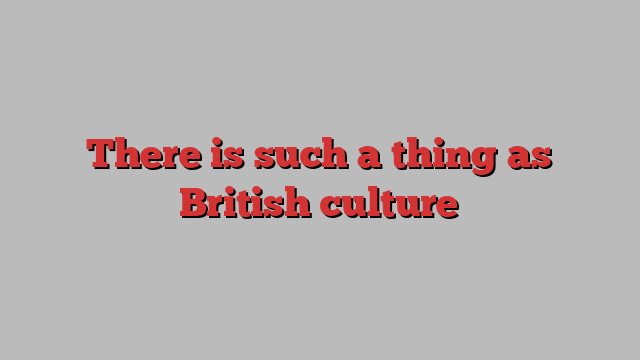
Unlock the Editor’s Digest for free
Roula Khalaf, Editor of the FT, selects her favourite stories in this weekly newsletter.
What is British culture anyway? It’s something that both Kemi Badenoch and Robert Jenrick have struggled to articulate during the Conservative party’s prolonged leadership election. Badenoch argued that some cultures were superior to others, but then was unable to set out exactly which cultures she meant. Jenrick warned that immigration was threatening English culture — but then couldn’t set out what, exactly, English culture was.
There are a number of theories as to why both candidates struggled. The wrong one is to think that they struggled because there is no such thing as English or British culture. There obviously is. My own family is split across three continents. We have a shared family culture, but we also have our own distinct English, American and South African cultures.
This is true even despite the fact that the part of my family that would pass muster with English ethnonationalists — the white South African bit which can trace its ancestry deep into England’s past — is culturally the least English. There is no question that a country in which 74 per cent of the population had the same culture, values and outlook as white South Africans would be a profoundly different country to England and Wales, where 74 per cent of people are white British. Culture evolves, changes and is shaped by events and crises — just like everything else.
You know it when you see it. Although the world has yet to produce a South African version of The Office, anyone who watches a couple of episodes of the American and British versions can see a different sensibility, a subtly different worldview, just as anyone who picks up a copy of the long-running South African cartoon Madam & Eve can see something else entirely at work. That isn’t to say that I don’t or can’t enjoy Peanuts as a Briton; it’s just to say that if Charles Schulz had moved to the UK as a child then he would have produced something completely different. I’m not going to pretend that this list is exhaustive, but there is a distinct set of British cultural mores, among them understatement, a commitment to scatological humour and an obsession with class, that have a heavy influence on most British cultural output.
This is not to say that a UK without distinctly British comedy or drama would be any less secure, cohesive or successful. Indeed, the insistence that something has to contribute to “community cohesion” or to national prosperity to be meaningful is part of why both Badenoch and Jenrick struggled to define what “English” or “British” culture might be.
Suggesting that understatement, crude humour or an obsession with class are important to sustaining the health of a nation is obviously ridiculous. In terms of community cohesion, national prosperity and the rest, what really matters to the UK is liberalism, religious tolerance, respect for people’s individual choices and their own bodily autonomy. So in a sense, who cares if those values lose their distinctively British accent?
But the cultural traits in question are worth preserving because without them, you don’t get cultural output as varied as Charlie Brooker’s Philomena Cunk and the video game MediEvil. These things are good in and of themselves.
And in a globalised economy, while you are not going to struggle for art and entertainment that assumes a shared set of broad-based, polity-sustaining liberal values, small and medium-sized countries like the UK and South Africa are not going to be able to maintain their own distinctive cultures without a degree of public subsidy.
This is what successive governments in France have recognised with their support for French language film and television. All British governments owe a great debt to the forward thinking of the Conservative administration of the 1920s in establishing the BBC licence fee. If you care about preserving a distinctive British or English culture, and not just a generic “this could be any liberal democracy” brand of liberalism, the BBC is the only game in town.
Yet both Jenrick and Badenoch were explicitly hostile to the corporation last week. Badenoch described it as an instrument of the left, while Jenrick, without any apparent thought or consideration, said that he was “sorely tempted” to back the scrapping of the licence fee. But there is no obvious way to produce or sustain a shared national culture or identity that doesn’t run through the public service broadcasters in general and the BBC in particular. Whatever annoyances its political output causes MPs of all stripes, they should remember that the corporation performs a cultural service that they could not easily replace.